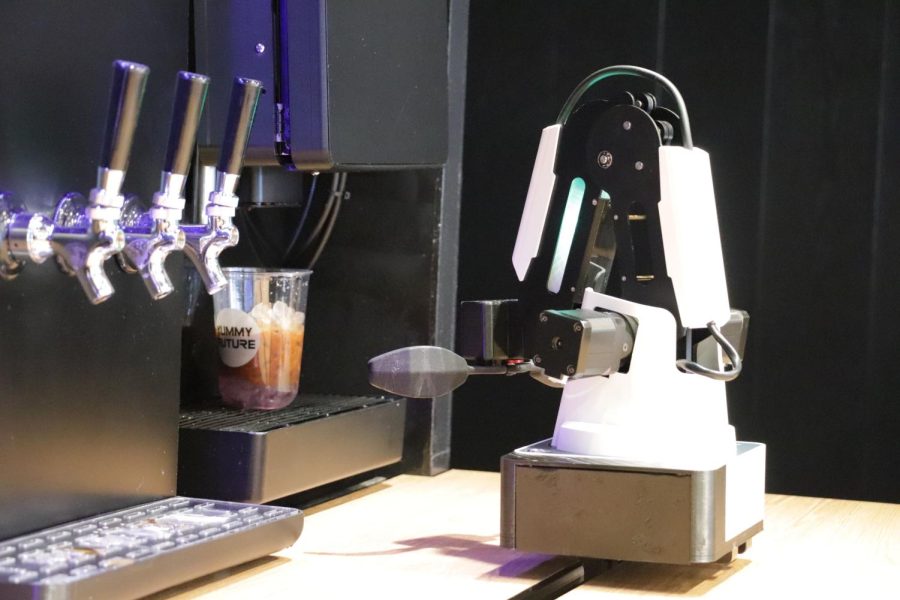Robotic coffee shop opens conversation about future of human employment
Mozart, the robotic barista, makes and pours drinks at the new coffee shop Yummy Future, located on Green Street, on April 10. With this being the first robotic coffee shop on campus and it increasing in popularity, some baristas worry about the future state of their job with technology taking over.
Apr 18, 2022
Mozart is a barista new in town. Whether you want a lavender latte, cream soda or strawberry lemonade, Mozart is ready to serve. Mozart also makes a drink in less than 30 seconds, works continuously for 14 hours and never gets paid.
Mozart is a robot.
Yummy Future, the first robotic coffee shop on campus, recently opened on Green Street. The robot barista, Mozart, features a mechanical arm programmed to brew beverages.
According to Guangzhe Cui, co-founder of Yummy Future, customer traffic has exceeded expectations.
“A lot of customers just like the futuristic vibes,” Cui said.
Get The Daily Illini in your inbox!
Robert Brunner, associate dean for innovation and chief disruption officer, attributed the emergence of robotics businesses to labor shortages for minimum wage jobs. Brunner said many companies now see the opportunity to utilize automation to adapt to the lack of workforce.
“One beauty of automation is its (ability) to do the same thing over and over again,” Brunner said. “You don’t have to worry about them getting bored.”
Brunner said he expects Yummy Future’s robotic coffee shop system to work effectively in environments with massive customer flow such as airports and shopping malls.
Cui said that they are also exploring potential markets in rural areas where traditional coffee shops are hardly accessible due to management and recruitment difficulties.
However, not everyone shares the excitement about the growth of robots.
Mikayla King, junior in LAS and Starbucks barista, worries robotic coffee shops will take jobs from human baristas.
“Corporations go like ‘oh, this is faster, get rid of all jobs,’” King said. “If people think that a robot can do a job, there’s no opportunity for an actual human to do that job.”
King said she doesn’t believe robots can fully replace human employees.
“In the morning and at night, I have to check temperatures, and I feel like a robot could do those things if they have it programmed, but how does the robot know if the thermometer is broken?” King said.
Brunner pointed out that although automation replaces simple, repetitive work, it creates more skilled job opportunities. He gave an example of automobile manufacturing where automated production lines improve accuracy while there is a growing demand for human employees to inspect the working status.
According to Cui, Yummy Future utilizes human-machine cooperation. With the robot taking the most burdensome work, Cui said the staff, mostly former baristas at regular coffee shops, now focus on overseeing the store and facilitating business.
“When we hire most of our baristas, they are happier,” Cui said. “Because they don’t need to stand there for long durations of time, pulling espressos and cleaning this and that.”
Julie Muňoz-Najar, a clinical assistant professor of Social Work, said people have romantic imaginations about how technology serves humans — she called this the enslavement of robots. Despite the novelty, Muňoz-Najar said she always stays cautious about how society interacts with this new economic approach.
She referred to the protests by Amazon workers last year against the workplace. As some people push back on robotic systems, Muňoz-Najar said Yummy Future may face a similar hurdle.
“People might come to them and say, ‘What are you doing to ensure that you’re still being a part of the community and not creating a bigger divide?’” Muňoz-Najar said.
Likewise, when asked if she would work for a robotic coffee shop, King shook her head.
“I don’t want to be near robots,” King said. “They’re very creepy.”
Cui said he empathizes with people’s natural resistance to robots. He said the primary responsibility of Yummy Future’s staff is to alleviate customers’ potential discomfort by familiarizing them with the machine.
While the robotic coffee shop system does not have much human interaction, Muňoz-Najar sees the transitioning role of human employees to offer a different type of care.
Cui mentioned the engineering team has added customization options based on the staff’s feedback. Unlike baristas who recommend drinks to satisfy customers’ needs, Cui said it takes years for the machine to achieve the same level of humanized design.
“It’s hard to get off the comfort zone, but we cannot just stay in the same place forever,” Cui said.
Muňoz-Najar emphasized the importance of retraining employees in a technology-centered market. Apart from barista techniques and customer service skills, she expects staff at robotic coffee shops to obtain human-machine knowledge that prepares them to work alongside the robot.
Knowing that automation is coming in, Brunner encourages students to think about the opportunities it will create.
“It can be scary because we are creatures of habit,” Brunner said. “But life is about adapting and evolving to how the environment is changing, and I think this is just another example of where you know you have to learn.”
To offer some insight, Bruner said students should ask questions about how to work with automated machines in future professional encounters.
“It allows you to make a bet on your future and say ‘I want to learn those skills now when I’m here at the University of Illinois,’” Brunner said. “How can I work with automation instead of fearing it? How can I work with it? How can I leverage it? How might I be able to position myself to be complementary or augmented in partnership with AI?”






